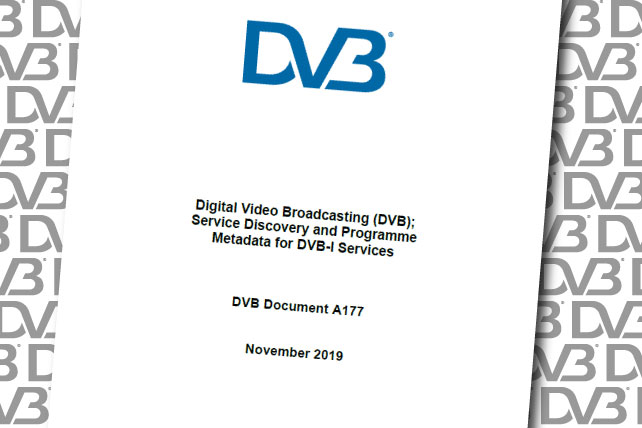
First DVB-I specification approved and published
The DVB-I specification was approved at this week’s meeting of the DVB Steering Board in Geneva. It has been published as DVB BlueBook A177.
The specification aims to ensure that linear television delivered over the internet is as user-friendly and robust as a traditional broadcast television experience. It offers the possibility for linear television services to be delivered to any device with a suitable internet connection and media player, including TV sets, smartphones, tablets and media streaming devices.
New deployment option
“In developing an internet-centric solution for linear television services, we are providing the industry with a crucial missing piece that raises internet-based delivery to the same level in the DVB ecosystem as RF-based content delivery,” said DVB Chair Peter MacAvock. “With these building blocks, addressing the discovery of DVB-I services and the delivery of programme metadata, DVB offers broadcasters and operators an exciting new deployment option.”
The DVB-I specification defines DVB-I Service Lists, a means for internet-connected devices to find curated sets of linear television services that may be delivered through broadband or broadcast mechanisms. It also defines the methods to retrieve electronic programme data for those services, which can be integrated into a single coherent offering that is accessed through a consistent user interface.
With the publication of the DVB BlueBook, implementers can now proceed with the development of DVB-I-enabled clients, while broadcasters and other content providers can take the necessary steps to make their services available via DVB-I.
Reference application
To accelerate the implementation of DVB-I in the marketplace, DVB launched an RFP to build a reference application. DVB expects to select a supplier and complete negotiations before the end of 2019 in time to demonstrate the initial results at DVB World 2020, taking place in Valencia, Spain, 9-11 March. The resulting DVB-I client will be made freely available under an open source license.
While DVB-I refers, in particular, to the newly approved specification for service discovery and programme information, the related ecosystem extends to other DVB specifications. The DVB-DASH streaming specification (DVB BlueBook A168) was recently updated to include a low-latency mode.
Also related to DVB-I is the forthcoming DVB specification for multicast adaptive bit rate streaming (DVB-mABR), targeting situations where the same linear content is simultaneously delivered over managed broadband networks to multiple receivers. Supporting the mass market scalability of internet-delivered linear television, DVB-mABR will reduce the overall network load.
